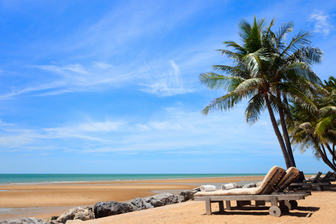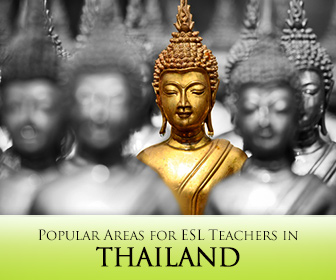Top 5 Dream Destinations for ESL Teachers


It is a fascinating country to get to know, and the best way to begin to understand this magical country is to spend some time living and working there. The vast majority of jobs available for foreigners are teaching jobs. There are many teaching jobs available all over the country, from the bustling cities to the rural villages, in the North, South, East and West. Teaching in Thailand offers a wonderful unique opportunity to see more of the former ancient Kingdom of Siam, whilst helping young people to improve their language skills and future prospects. Many people forget that, although better off financially than many of its neighbours, Thailand is still classed as a developing country.
If you want to work in a place where you struggle to see another foreign face, you can find it. If you want to work in a place with an established expat community, you can find it. I started my ESL teaching career in Thailand in a smaller town where there were nine other foreigners living in the town, and no tourists passing through. I then took my second position in a larger town, where there was a large expat community, probably in excess of 100, and which saw many tourists on a daily basis. Both places provided very different but enjoyable experiences.

The capital of Bangkok has many teaching opportunities across the various districts. As well as government and private schools, including the top end international schools, there are also university positions and language school opportunities. Bangkok is a city that most people either love or hate. Some people are attracted by the international and cosmopolitan feel, the great shopping, the fun attractions, delicious Thai and home comfort food, the dazzling lights and the party atmosphere. Other people are shocked by the prominence of lady-boys, known as kathoey, and sex workers, and are turned off by the hedonistic party scene. Also, the cost of living in Bangkok is significantly higher than other parts of the country, and although the wages are higher, they do not make up for the price differences. Personally, I think Bangkok is a wonderful city to visit, but I would not want to live there.
Chiang Mai in the north is often viewed as Thailand’s second most important city. It also has a significant expat teaching population, but the vibe is totally different to that in Bangkok. It has a much slower way of life and costs are generally a lot less than in other parts of the country. There is spectacular scenery with a great choice of outdoor activities, as well as wonderful cultural attractions. Some people may find Chiang Mai a bit too sleepy though for the longer term.
Phuket sees many tourists as well as people looking for a job near a beach idyll. It has good facilities and amenities for foreigners, and a major draw is the wonderful beaches right on the doorstep. Costs can be high.
Krabi town and Krabi Province are popular areas because of the easy access to pristine islands, beautiful beaches and great climbing opportunities.
Ayutthaya, in central Thailand, has a decent amount of ESL teachers, and has the benefit of being close enough to Bangkok for a night out, a shopping spree, and to transit through on the way to somewhere else, but far enough away to escape the large crowds and intensive party atmosphere. It is an ancient city with many temples and an elephant stay program.
Khon Kaen has a sizeable teaching community. Located in Isan, it is the commercial and political heart of the North-East. It is a sprawling city, with a handful of local attractions and a decent night life.
Isan’s Surin attracts teachers who want a larger city but in a less touristic area. Famous for the yearly Surin Elephant Round Up, where hundreds of elephants parade though the streets and enjoy a banquet, wages may be lower in Surin, but the cost of living is also lower.
There are various teaching positions on the larger islands in the South, although these are highly sought after and competition may be fierce. Many people are attracted by the prospect of living and working on an exotic and tropical island, so if you really want a job on one of the islands it is advised to apply for many positions, and don’t take any rejections personally. As an alternative, you could try schools on the mainland areas, which are within an easy distance to enjoy weekends. There will probably be less passing foreigners though, as many people skip the mainland beaches en route to the islands. This may provide the solitude that you crave, or may make you lonely and bored.
Lesser visited or rural provinces often have a decent, if small, expat community, as usually a school will hire several foreign teachers. I worked in a school in Sing Buri town, in central Thailand, and there was another foreign teacher as well as myself. A couple of other schools also employed native English teachers, making a small band of teachers in the town. Other places to consider in central Thailand include Lop Buri, famous for marauding monkeys with a fairly constant stream of tourists, Suphan Buri, with a rich tradition of buffalo farming, and the beautiful and historic Kanchanaburi. South of Bangkok you could try Petchaburi, with quiet beaches and caves, Trang, with its islands steeped in local legend, Surat Thani and Nakhon Si Tammarat, generally transit points for the islands, and Hat Yai near to the Malaysian border. In the North Chiang Rai, Sukhothai, and Lampang are fairly popular, and in Isan, Nakorn Ratchasima contains one of Thailand’s most popular national parks.
Anywhere where you can find a teaching job you are highly to find other ESL teachers living in the area. The main difference is the amount of foreign teachers in any given place. A smaller number of teachers does not signify a worse place to teach, and, likewise, a higher number of expats does not mean that a place is better. The numbers of teachers are based on the demands of the local educational establishments, and wherever you choose to teach you will likely make new friends and have wonderful experiences right from the very beginning of your new adventure and teaching career in Thailand.
Have you worked in any of the listed towns, and if so, would you rate them as popular places to teach?